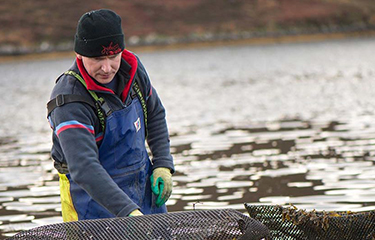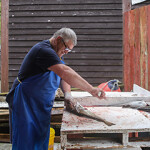Ireland’s diminishing water quality threatens shellfish sales to Asia

The Atlantic shoreline of Clew Bay in County Mayo, Ireland, looks both pristine and wild in the giant photo billboards at the Xanadu Hotel in Guangzhou, one of China’s wealthiest cities. At a recent Irish seafood marketing event at the hotel hosted by Irish product-marketing agency Bord Bia, and broadcast on the Chinese Weibo social media platform, the images displayed alongside captions describing a “Green Isle” of pure waters that feed oysters, lobsters, and shrimp.
China is the world’s biggest seafood market, with a special appetite for exotic seafood and a subset of consumers willing to pay premium prices for product that can be certified as coming from clean ocean waters. Hence Bord Bia’s marketing campaigns in hotels frequented by the country’s wealthy. Diners at the Xanadu were, after all, paying premium prices. An oyster from Europe costs anywhere between USD 10 and USD 30 (EUR 9 and EUR 38) in seafood restaurants in China.
Some photos at the Xanadu were taken on the coast of Achill Island, where oyster farmer Hugh O’Malley has been packing his Achill Island Oysters for Chinese buyers. In 2014, O’Malley sold his software business to return to his roots in Mayo on the lightly-populated west coast. O’Malley told SeafoodSource he grew up seeing the wild-catch fisheries sector wilt with collapsing fish stocks, and now sees aquaculture as a sustainable replacement.
“I grew up in a house where the Fishing News was our weekly newspaper of choice,” he said. “The wild-catch business is not sustainable but aquaculture is deeply sustainable. It keeps people in the peripheral communities, it brings employment and infrastructure like communications so these communities thrive.”
Villages on Mayo’s Atlantic coast are, partly by virtue of their location, repositories of generations of expertise in the production of premium seafood for which there’s now a market, O’Malley said. But Ireland’s state-run marketing agencies, including Bord Bia, allow a small firm like Achill Oysters a long reach.
“Thank God for Bord Bia. They brought us to a seafood fair in Brussels and that gave us the introduction to the Far East,” he said. “We market through them. They were really proactive during the pandemic.”
Logistical difficulties reaching the country during the pandemic means China is no longer as important as it once was for O’Malley, who largely built the business based on demand he saw in wealthy Chinese cities. However, Achill Oysters grew sales in Ireland 20-fold during the pandemic.
“Post-pandemic, all our customers in retail came back to us,” O’Malley said. “Closer to home is becoming more important. In the E.U., there is a real taste for oysters. And we have a lot of really good customers in Ireland who are instrumental in ensuring that our production is where it is.”
Now, international markets are also returning for Achill Oysters, according to O’Malley.
“The Far East is still really important for us. We sell to China, Hong Kong, Thailand, and to Malaysia and Singapore,” he said. “Oysters sell best where you can see the sea.”
O’Malley who employs ten at Achill Oysters, drives his oysters to a distribution center near Shannon Airport, which means the oysters are theoretically 36 hours from all global marketplaces.
O’Malley’s oyster-cultivation process, using trestles and netted bags in a windswept bay on Achill’s more exposed west side, is picture-perfect for prospective buyers in China.
“Mayo has very good water quality. It’s rural so there are no large municipalities, thus the water is cleaner. We are on the Sound side of the island. We get the gales, so nature does the shaking,” said O’Malley, a reference to the process of physically shaking the oyster bags every fortnight to improve circulation and growth among the oysters inside. “When I listen to the shipping forecast on the radio and hear it’ll be six to eight and rising to nine [45 knots of severe gale force], I know I won’t shake the bags for a fortnight!”
Currently, the biggest threat to O’Malley’s business is water quality and temperature. Ireland’s Environmental Protection Agency (EPA) recently raised concerns about the deterioration in the quality of Ireland’s freshwater resources, pointing to increased pollution from wastewater and the country’s agriculture sector. Climate change is also impacting oyster farms in Mayo.
“The big challenge at the moment is the changing environment, as the data shows,” O’Malley said. “The warmest weeks have turned into the warmest months.”
O’Malley said there have been periods of time in the past few years when the water temperature hits a mean of 25 degrees over a 24-hour period, resulting faster growth but more stress for his oysters.
“To reduce the heat stress, we are handling them less, if at all. There’s a lot more food in the water, but the oysters are stressed in ways they weren’t before from higher temperatures,” O’Malley said. “[I’m] putting in a lot of investment to mitigate the impact on the oysters. How we transport the oysters and process and procedures for handling the oysters have all changed.”
The water quality of Mayo’s coast is a selling point for another local shellfish farmer Michael Mulloy, whose Blackshell Farm rope-grown mussels in from Clew Bay mature in cycles of up to three years before being processed in Bantry and Westport. Clew Bay recently retained its Class A water-quality status granted by the Sea Fisheries Protection Authority (SFPA).
“Mayo is not the center of the world and that is in our favor,” Mulloy told SeafoodSource. “It has a very good environmental profile.”
Mulloy said his mussel farm had “a pretty good year” in 2022. Mulloy sells his mussels to processor Connemara Seafood, which supplies buyers across Europe.
“They’re vacuum-packed and IQF [individually quick frozen]. We supply the mainstream end of the market, which is more resilient,” Mulloy said. “Even through Covid there was no disruption – our buyers in France and Germany and Holland kept buying.”
Even with warming waters, western Ireland’s oyster industry has been relatively well-off compared to continental Europe, he said.
“Shellfish production in France has been flat,” Mulloy said. “Heatwaves have stressed production.”
In the past two decades, French shellfish farmers have come to Mayo seeking cooler waters, often bringing investment and technology to partnerships with local growers. And French mussel traders had been coming for decades before that for commercial reasons, Mulloy said.
“Going back 40 years, French buyers turned to Mayo when they ran out. We’d go hell for leather from February to April growing for them. But now the processing has taken the seasonality out of it,” he said.
Photo courtesy of Achill Oysters





Share